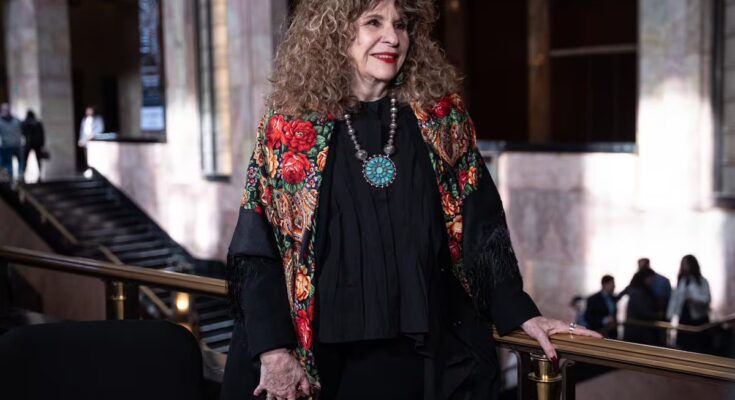Writer Gioconda Belli said Tuesday morning that she almost didn’t make it to Mexico to receive the Carlos Fuentes Prize. A technical fault caused the plane carrying her from Madrid to New York to land, where it collided with chaos caused by the government shutdown, affecting US airports. Moreover, the cold has not left her these days. “It’s all very poetic, because it’s another struggle to get to Mexico,” he said. “The first time I arrived on December 20, when I left my home for exile,” the writer recalled about her first departure from Nicaragua due to being involved in the guerrilla war against the Somoza dictatorship at the end of the 1970s. Belli returns to Mexico from another exile, the Spanish one imposed by Daniel Ortega’s regime, but he does so to gain recognition for his literary work. In his emotional acceptance speech for the award at the Palace of Fine Arts, he recalled the support that Mexico has given to the anti-somocist struggle and asked: “I hope that Mexico and its government recover the memory of solidarity and understanding and realize that there is no sovereignty when it is not supported by the will of the people.”
Belli recalled the support that Mexican intellectuals, led by Carlos Fuentes, gave to the Sandinista revolution after its victory in 1979. “I lived several months in Mexico, which was my first safe haven, the cradle of a magnificent solidarity movement that had the support of great Mexicans such as Carlos Pellicer, Carlos Fuentes, Carlos Monsiváis, Elena Poniatowska and many others. The government of José López Portillo also led a regional offensive to isolate Somoza and severed diplomatic relations with his government on May 20, 1979,” he recalled. And he warned: “The legacy and symbolic dimension of the Sandinista revolution are today the screen behind which the current rulers of Nicaragua hide. And there are still those who support them, despite the widely documented crimes and violations of human rights which demonstrate that my country has once again become a dictatorship equal to or worse than that of Somoza.”
A dictatorship that brought her back into exile, she recalled, after depriving her of her Nicaraguan nationality and confiscating her house in Managua. “I can imagine that the belligerence and the word of Carlos Fuentes would have been frightened by the tyrannical drift of Nicaragua under the government of Ortega and his wife Rosario Murillo. Not even fiction, I think, would have allowed him to hide that I would be here, that I would come to Mexico to receive this award after having been expatriated, confiscated and declared a traitor to my country. And that his friend Sergio Ramírez would have accompanied me in Sergio and I, with no other guilt than that to use our words, we have been victims of the abuses of power and the manipulation of justice in our country. We have had to see how harsh the memory is of that revolution to which we surrendered and which rightly sparked so much enthusiasm in the world”, he remarked.
This is why the writer appealed to Mexico’s solidarity, when the silence of Claudia Sheinbaum’s executive characterizes the position of Latin American power against the Ortega regime. “It is clear that times have changed, with a world increasingly driven towards authoritarianism, racist discrimination and the primacy of corporate and millionaire interests. Wonderful technology is put at the service of consumption and, paradoxically, brings us closer and informs us, but also distracts us and distances us from the sense of community. All these realities, however, require us to protect hope and faith in humanity”, he launched an appeal.
Belli gave Fuentes’ political commitment as an example. “One of the qualities that I most admired in that cultured, passionate man, committed to his time, was precisely his responsibility as an intellectual,” he said. “I had the privilege of meeting him in the midst of the euphoria of the first days of the Sandinista Revolution. And I remember that his presence for us, other young people, writers, dreamers, militants, was a stimulus, because we admire in his work the constant reminder that the imagination has an umbilical cord with reality and political circumstances over time,” he recalled.
Her homage to the Mexican was not only political, but literary, because she said that, although she had been a voracious reader as a young woman, the literature of Fuentes, the first boom author she read, marked her. “Carlos was also an instigator of the imagination to find in the depths of history the answers that would allow us Latin Americans to appropriate our common identity. His integrative vision aspired to enable us to incorporate an inevitable past, that network of holes, as the poem says, into a solid and rich construction to inhabit what he called the territory of La Mancha. I have many debts to Carlos Fuentes and his humanist and mobilizing conception of literature…”, he stated.
The death of Artemio Cruzshe said, it was one of those Fuentes books that affected her the most. “Dissatisfied with the role of a young woman married to a good, but sublimely boring and apathetic husband, and with that country suffocated by the millstone of a dynastic dictatorship, Carlos’ book shook me, not only politically, but aesthetically. I understood how words can give life to characters that portray and allow us to understand history and the human being within it. I also understood the ambiguity of evil. I found in it my desire for identity and also the confidence to take risks, taking the reins of imagination and gave me permission to believe in that famous debate between committed literature or not: how to commit and be great at the same time,” he explained;
Gioconda Belli received the award from Leonardo Lomelí Vanegas, rector of UNAM, and from the Secretary of Culture of Mexico, Claudia Curiel. The award, worth $150,000, was given to him for “his ability to renew Latin American poetry and the strength of his dialogue between society, history and literature”. Belli closed his speech with an appeal in favor of literary creation. “Literature can be a form of memory and also a way to repair people’s souls. Thanks to literature and words that have bequeathed to us human beings a language to express beauty and appeal to emotions that reveal the depths and heights of the human condition, an intimate language, but one that makes us recognize ourselves and immerse ourselves in the flow of stories and experiences that have built us as a species. I give thanks to the life that has served me a banquet of intense, bitter and sweet experiences.”



